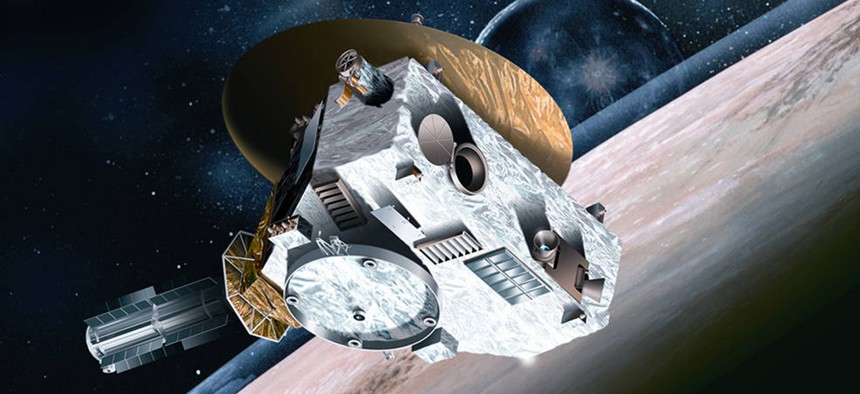
Artist conception of New Horizons Spacecraft. Johns Hopkins University Applied Physics Laboratory/Southwest Research Institute
What Comes Next After NASA’s Pluto Mission?
Space advocates hope the event makes the case that planetary travel is a worthy pursuit.
NASA is about to make history.
On Tuesday, NASA's New Horizons spacecraft will pull off a major feat when it glides past Pluto, a dwarf planet at the outskirts of our solar system. The mission is expected to dramatically expand the frontiers of space exploration by offering up a never-before-seen glimpse of the mysterious mass of rock and ice.
New Horizons would never have gotten off the ground without painstaking negotiation in the hallways and back rooms of Congress. On Capitol Hill, Democrats and Republicans eagerly await the results. And many hope that a successful mission and PR splash wins NASA political capital that will help the agency down the road.
"This is NASA doing what it does best, pushing the boundaries of our imagination by traveling to the unknown," Sen. Ted Cruz, a vocal advocate of space exploration, told National Journal.
The event has capitvated the public. But nothing about planetary travel is guaranteed. NASA briefly lost contact with the New Horizons spacecraft earlier this month. And as the world holds its breath, many lawmakers wonder what comes next, while some fear that America has not adequately invested in the future of space exploration.
"I'm really concerned with how we have let our space program erode," Senate Majority Whip John Cornyn of Texas said. "I think this should be a matter of national pride and somewhere we can demonstrate our success, as we have historically, and inspire the next generation of scientists."
A major partisan dispute in Congress revolves around whether NASA should shift funding away from Earth-science programs to focus more heavily on space travel. A number of high-profile Republicans, including Cruz, have suggested that the agency should adopt a "more space, less Earth" mentality, while Democrats argue that Earth science is just as critical as planetary exploration.
"I still think Earth is the most important planet in the solar system. It's the only place we can live, so NASA's missions in Earth science are extremely important and should be funded as well," said Michigan Democratic Sen. Gary Peters.
Still, some senators believe America is not doing enough to explore space.
Sen. John McCain wants to see a human travel to Mars, and worries that NASA is far from achieving that aim.
"I would like to see direction from the president of the United States and Congress to get a man or a woman on Mars in 'x' number of years and have that be the focus," McCain said. "Look, I'm not against this [Pluto mission], but it's not going to capture the imagination in the same way."
Exploring the solar system is no easy feat. New Horizons has been hurtling through space for nine years en route to Pluto. Space advocates hope that the voyage will remind the public that planetary travel is worth the wait.
It can be difficult to build institutional support for these missions but this should be a reminder of the payoff," said Casey Dreier, the director of advocacy for the Planetary Society, a space advocacy organization. "If this doesn't get lawmakers excited about the possibility of NASA, I don't know what will."
Of course, plenty of senators already are excited about New Horizons.
As the clock ticks down, Maryland Democratic Sen. Barbara Mikulski will visit the mission operations center at the Johns Hopkins Applied Physics Laboratory in Laurel, Maryland, on Monday to cheer on the men and women helping steer the spacecraft. Mikulski is an ardent supporter of NASA and fought hard during the early 2000s to make sure that the mission got off the ground.
Sen. Bill Nelson, a Florida Democrat, spent nearly a full week in space as a mission specialist on a NASA space shuttle that took off from the Kennedy Space Center in the 1980s. He sees the mission as an opportunity for NASA to push the boundaries of space travel.
"Every time we venture out, we develop new technologies and bring back advancements in knowledge and innovation that help improve life here on Earth," Nelson said. "The Pluto mission is another small step in our long-term journey to explore and one day settle other planets."
Montana GOP Sen. Steve Daines has taken a particular interest in the mission because of his background in chemical engineering, while Alaska Republican Sen. Dan Sullivan has brushed up on the history and facts of the New Horizons voyage in anticipation of the event.
"I've always been a believer that success breeds future success; it's always great to see important milestones achieved," Daines said.
"There's always pride when America is able to pull off a technological feat that no other country in the world has managed," added Sen. Susan Collins, a Maine Republican.
NEXT STORY: As Deadline Nears, Highway Bill Still Stalled







